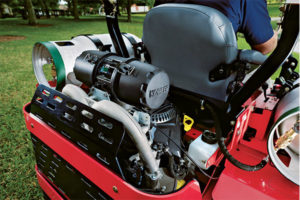Propane provides green energy for the green industry
Growing gallons: It’s often easier said than done. But the path to achieving this goal may be just outside on propane marketers’ front lawns.

Propane provides landscape professionals with clean-burning opportunities. Photo courtesy of the Propane Education & Research Council
The commercial lawn mower market is an ideal avenue to propane gallon growth that is mutually beneficial to the fuel marketer and the landscape professional. For propane marketers, the busy mowing season provides a different revenue stream during the propane industry’s less demanding summer months. For landscape professionals looking to avoid carbon restrictions and promote themselves as a “green” industry, propane is a solid alternative fuel option.
“The landscape industry likes to call themselves the original green industry, but the fact of the matter is gasoline and diesel are very dirty fuels,” says Jeremy Wishart, director of off-road business development for the Propane Education & Research Council (PERC) during an interview with LP Gas’ sister publication, Landscape Management.
Propane’s capacity to reduce emissions – among other benefits – is the link to a “green partnership” between propane marketers and landscape contractors.
A green partnership
Switching to propane mowers provides landscape contractors with some important advantages, including fuel and labor cost savings; environmentally friendly operations; reduced maintenance; and minimized risk of spilled, wasted or stolen fuel.
As Wishart notes, propane also offers competitive pricing, a benefit landscape professionals and propane marketers share.

Landscape professionals can benefit from securing fuel contracts. Photo courtesy of the Propane Education & Research Council
“For the landscape contractor, it really comes down to insulating themselves from the volatile markets of traditional fuels – the fluctuations from weather, a geopolitical event, a refinery going down, or even just regional pricing differences that affect the market for gasoline or diesel,” he says. “Those prices can fluctuate widely from week to week, from month to month and certainly from year to year.”
Landscape contractors and propane marketers can negotiate a fuel contract that secures enough fuel for the three-month mowing season, a year or even a multi-year fuel supply. This contract locks in the fuel price for landscape contractors and ensures consistent gallon sales for the propane marketer, often during the summer season when mowing is at its peak.
“I always ask a landscape contractor: ‘Would you like to save money?’” Wishart says. “Of course, they say yes, and I say, ‘Here’s a simple way to save money by converting your equipment to propane.’”
Outside of fuel and maintenance savings, propane allows landscape contractors to work during Ozone Action Days and in non-attainment areas, which authorities may designate during the mowing season to reduce air pollution.
Propane also helps landscape professionals appeal to more “green-minded” communities, explains Brett Wegner, product manager of Kohler Engines, during an interview with LP Gas’ sister publication, Landscape Management.
“Since propane is a clean-burning fuel, [Kohler’s] models are ideal for states that enforce Ozone Action Days,” says Wegner. “Using propane-powered equipment can also help commercial cutters win business contracts with organizations and municipalities seeking to incorporate more ‘green’ fuels and technologies.”
Get to the market
Propane marketers can supply the fuel, but engine manufacturers need to provide the hardware.

Electronic fuel injection propane engines precisely monitor fuel based on operating conditions like air quality and temperature. Photo Courtesy of Kohler Engines
Kohler Engines, Wishart explains, introduced its Command Pro electronic fuel injection (EFI) propane engine to the market about five years ago. EFI precisely monitors fuels based on all of the operating conditions. The technology measures everything from load to ambient air temperature to air quality. The fuel system itself constantly measures and adjusts the air-to-fuel ratio to optimize the performance of the engine, improve fuel efficiency and limit the amount of emissions. When propane is added to an EFI system, Wishart says, the system’s benefits are amplified.
Kohler originally faced little competition, but other engine manufacturers are joining the field. Companies working toward propane-electronic fuel injection on their small engines are playing a bit of catchup with Kohler, Wishart explains. There are even some companies working toward propane EFI aftermarket conversions. He expects more manufacturers to come out with their own version of the technology over the next few months.
PERC worked with Kohler during the development of its propane-powered engine but is now working to broaden its horizons with these other manufacturers. PERC aims to bring these manufacturers up to speed and get other products into the marketplace, Wishart explains, because promoting market growth in the “green industry” is also a plus for propane marketers.
Wishart recently attended the Outdoor Power Equipment Institute and heard, across the board, that mower sales have been doing well.
If landscape contractors are buying equipment, Wishart says, it has to be good for propane, too.
















